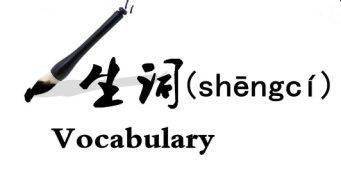3.  (Bàn tú ér fèi)
(Bàn tú ér fèi)
To Give Up Halfway
Listen to the whole story
Note: If you are reading this story via Adobe Reader, Foxit Reader or PDF-XChange, you can listen to the audio files by scrolling over the red speaker button and double-clicking.
Wèiguó yǒu gè jiào Yuè Yángzǐ de rén dào yuǎnfāng qù xúnshī qiúxué.

There was a man called Yue Yangzi in the Wei State who went far away to study.
Yì nián hòu, Yuè Yángzǐ jiù huílái le.

A year after departing, he returned.
Qīzi wèn tā wèihé zhème zǎo jiù huíjiā le.

His wife asked why he came back so early.
Yuè Yángzǐ shuō: "chūmén shíjiān cháng le xiǎng jiā."

He said, "I've been away so long, I just missed home."
Qīzi tīng hòu, ná qǐ yì bǎ jiǎndāo bǎ gāng zhī hǎo de bù jiǎn duàn le.

Then his wife took a pair of scissors and cut the cloth she had just woven.
Ránhòu shuō: "zhè bù shì yì gēn sī yì gēn sī jīlěi qǐlái de, wǒ xiànzài yǐ jiāng tā jiǎnduàn, zhèyàng yǐqián de shíjiān jiù dōu báibái làngfèi le."

Then she said: “This cloth was woven one thread at a time. Now I have cut it, so the time spent weaving it was wasted.”
Qīzi jiēzhe yòu shuō: "dúshū yěshì zhèyàng, yīnggāi měitiān huòdé xīn de zhīshi, rúguǒ bàn tú ér fèi, hé gēduàn zhībù yǒu shénme liǎng yàng ne?"

Continuing she said, “Study is also like this. You should learn new knowledge everyday. If you give up halfway, it is the same as cutting the cloth."
Yuè Yángzǐ bèi qīzi de huà shēnshēn gǎndòng le, yúshì yòu qù wánchéng xuéyè, yì lián qī nián méiyǒu huí guò jiā.

Yue Yangzi was very moved by what his wife said and went on to finish his studies. This time, he didn’t return home for seven years.
This story tells people not to do things halfway. It is also frequently used now to persuade people to persist in their study or work.
 Key Learning Points
Key Learning Points
1.  (huíjiā): v. To go home.
(huíjiā): v. To go home.
Example:
Shíjiān bù zǎo le, wǒ děi gǎnjǐn huíjiā le.

It's getting late and I must go home.
2.  (ránhòu): adv. Then/after that.
(ránhòu): adv. Then/after that.
" (ránhòu)" is a phrase showing that one thing follows another. Now it has become a frequently-used phrase in daily life, especially on talk shows.
(ránhòu)" is a phrase showing that one thing follows another. Now it has become a frequently-used phrase in daily life, especially on talk shows.
Example:
Mài Kè: Qǐngwèn fùjìn yǒu shūdiàn ma?

Mike: Excuse me. Is there a bookstore near here?
Zhāng Jié: Nǐ yánzhe zhè tiáo lù yìzhí zǒu, ránhòu zuǒ zhuǎn jiù néng kàn dào le.

Zhang Jie: Can you see that road? Just go straight along it, then, turn left, you can’t miss it.

1.  (làngfèi): v. To waste.
(làngfèi): v. To waste.
2.  (gǎndòng): v. To be moved.
(gǎndòng): v. To be moved.
3.  (shíjiān): n. Time.
(shíjiān): n. Time.
4.  (dúshū): n. Study.
(dúshū): n. Study.















 (huíjiā):
(huíjiā): 
 (ránhòu):
(ránhòu):  (ránhòu)" is a phrase showing that one thing follows another. Now it has become a frequently-used phrase in daily life, especially on talk shows.
(ránhòu)" is a phrase showing that one thing follows another. Now it has become a frequently-used phrase in daily life, especially on talk shows.


 (làngfèi):
(làngfèi):  (gǎndòng):
(gǎndòng):  (shíjiān): n.
(shíjiān): n. (dúshū): n.
(dúshū): n.